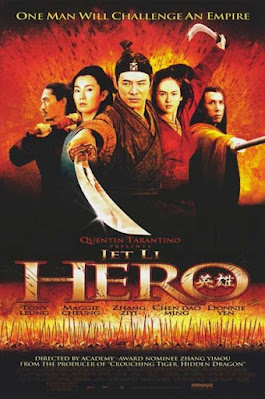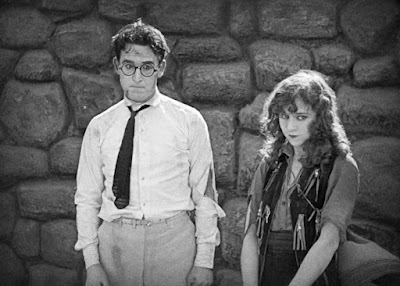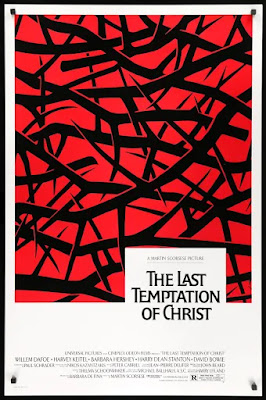"
Hero"
**** (out of ****)
Zhang Yimou's "Hero" (2004) is a tale about honor, love, betrayal, war, peace and yes, heroism.
What does it mean to be a hero? Does being a hero require feats of strength? Must it involve fighting and killing? The movie's poster has a man with a sword in his hand. Does a hero need to act honorably and have a strong moral code? Is a hero the one that starts a fight or walks away from it?
"Hero" was a departure for the great Fifth Generation Chinese filmmaker Zhang Yimou. The ever brilliant Yimou had acquired a reputation for making period piece dramas with sometimes subtle social and political messaging. Sometimes the messaging wasn't so subtle - as was the case with Yimou's masterpiece, "To Live" (1994), which resulted in the Chinese government banning Yimou from making films for two years. "Hero" was a martial arts movie, coming to U.S. audiences four years after the hugely successful "Crouching Tiger, Hidden Dragon" (2000) - the highest grossing foreign film at the U.S. box-office for the time.
Perhaps because of this change in genres, it seemed to me "movie critics" (AKA sheep) got distracted in their admiration for the choreographed fight scenes and never really acknowledged what "Hero" or any of Yimou's subsequent martial art movies were about. That includes the positive reviews too! The great movie critic, Michael Wilmington, described "Hero" in his Chicago Tribune review as "a feast of lavish visuals and a heart-stopping explosion of cinema pyrotechnics and fight choreography that, in scene after scene, leaves you almost breathless." I agree with all of that but it says nothing of the drama of the plot and the themes Yimou is working with.
While a lot of critics, and the general public, sought to compare "Hero" to "Crouching Tiger", it actually isn't a good comparison. "Hero" covers the same time period as "The Emperor and the Assassin" (1999) directed by fellow Fifth Generation filmmaker, Chen Kaige. Structurally "Hero" lends itself to comparisons to Akira Kurosawa's masterpiece, "Rashomon" (1950). The "Crouching Tiger" comparisons I believe were done because it was topical and most mainstream audiences probably hadn't seen a martial arts movie prior to "Crouching Tiger". But again I must point out, even "Crouching Tiger" was about more than its fight scenes.
By the time "Hero" reached U.S. audiences - two year after its Chinese release - the United States was engaging in two wars - Iraq and Afghanistan - by a president, George W. Bush, who had argued against "nation building" during the 2000 campaign. It wouldn't be a tremendous stretch for audiences to think about such things while watching a film about a leader seeking to "nation build" and create one unified country. The China shown in "Hero" has eight warring Chinese states. Much blood has been spilt to achieve this goal set forth by the King. War, nations and peace was on a lot of our minds at the time. And it is these connections several "movie critics" at the time ignored.
"Hero" follows a young orphan warrior named Nameless (Jet Li). Because he was not bound by any family honor, we are told, he devoted himself to the sword. He has been invited to sit with the King of Qin (Daoming Chen) thanks to his amazing accomplishment of killing three of the King's most feared enemies - Sky (Donnie Yen), Broken Sword (Tony Leung Chiu-wai) and Flying Snow (Maggie Cheung) - three assassins from the city of Zhao that have tried to take the King's life. How could one man have killed these skilled assassins when the King's army couldn't?

Nameless reveals to the King that his strategy to defeat the assassins didn't involve swordplay as much as it did outwitting them, pitting them against each other, preying upon feelings of love, jealousy and betrayal. In Nameless' scheme he turns Flying Snow and Broken Sword against each other when Nameless confesses Sky's dying thoughts were about his love for Flying Snow. From that point on the characters self-destruct resulting in Nameless' ultimate victory. But is Nameless' story true? That provides the excitement and intrigue to Yimou's film.
In "Rashomon" fashion we begin to see events played out in different ways from different character points of view. While each story seems plausible we slowly begin to see the grander scale of the film. This isn't merely an action martial arts movie but a deeper, richer story questioning national identity, patriotism and heroism. It is a contemplative look at war and peace. While it uses a historical setting, it was very much a story of the (then) current times.
Or, as some "critics" have commented on when reviewing Yimou's latest films - "Cliff Walkers" (2021), "Shadow" (2019) and "Full Red River" (2024) - Yimou has been restricted by the Chinese government and has begun telling stories that shed a positive light on his country. "Hero" tells an emotional story about China's first Emperor and the eventual building of the Great Wall. "Hero" would seem to be the beginning of this new style of storytelling from Yimou after being banned from filmmaking twice. It could have been considered Yimou's amends to the government.
Whatever its motivations "Hero" is also a beautiful looking film - as practically every Zhang Yimou film is! Yimou and his cinematographer, Christopher Doyle place special emphasis on certain colors - primarily red, blue, white and green. Some of the fight scenes take place during different seasons. One of the most beautiful sequences takes place in a forest, in what appears to be Autumn, as a saturated red dominates the screen. With red being symbolic of jealousy, which in some ways the fight scene is about, the shifting of colors reflects on different emotional perspectives.
The jealousy of the "red scenes" are contrasted nicely with the purity of "white scenes" between Broken Sword and Flying Snow as they reflect upon their past love and promises to each other. Their interaction also hits on a theme of masculinity, with Snow looking down on Sword for some of his actions (or lack of). The "white scenes" are further contrasted with the "harshness" of an opening sequence, mainly focusing on the color black, in the rain with Nameless battling Sky.

Some have complained "Hero" is "style over substance" and the film lacks an emotional center. This was summed up by critic Mike Clark when he was over at USA Today. He acknowledge the film could gain a cult following but wrote, that is "despite shortcomings in storytelling" and went on to add "because it gets you on some fundamental film lover's level - but dramatic isn't quite the one." I guess I'm just a big teddy bear softie because there are moments when I found "Hero" quite touching. Some of the more emotional scenes involve Broken Sword and Flying Snow. Actors Tony Leung Chiu-wai and Maggie Cheung were in the mesmerizing "In the Mood for Love" (2001) directed by Kar-Wai Wong. Here they do a slight variation on the themes presented in that film - two people that have allowed politics and social conditions to interfere with their love. Nameless may be the film's lead character but Broken Sword is in many ways the film's moral and emotional center.
By the end of "Hero" the audience must ask themselves, who is the real hero of this story? Is it Nameless for defeating the assassins? Is it any of the assassins for wanting to stop a King from engaging in a war? Is it the King for wanting to unify a country? Are all of them heroes? Does our answer to this question depend on our definition of a hero?
Although we are dealing with a martial arts movie or more accurately a wuxia movie, as known in Chinese culture, can we compare Yimou's film to the American western genre? Could the character "Nameless" be a nod to Clint Eastwood's character in Sergio Leone's "Man with No Name" trilogy? In those westerns and Eastwood's later movies, the concept of a "hero" was also played around with. "Hero" didn't necessarily mean an ultra good-guy like John Wayne. There could be shades of gray. Is this a point Yimou is making here with his characters?
Much like "Crouching Tiger", "Hero" ended up being a box-office hit, grossing more than $53 million at the U.S. box-office, thanks in no small part to the terrific cast - Li, Cheung, Leung and Ziyi Zhang. The film was also nominated for an Academy Award in the best foreign film category. I personally declared it one of best films of 2003 - I saw it before it hit U.S. theatres by buying a Chinese DVD, and other critics like Richard Corliss of Time Magazine called it the best movie of 2004.
As we are in the midst of the "year of me" - a celebration of my own birthday milestone, leading me to discuss important films and artists, I very much wanted to discuss Zhang Yimou, whom I have neglectfully ignored on this blog for the last 15 years. I have only reviewed two of his movies -
"Curse of the Golden Flower" (2006) and the film released the same year as "Hero",
"House of Flying Daggers" (2004). This is despite the fact Yimou has been one of my favorite filmmakers these past 23 years, since I first discovered his work. He has also been the most celebrated filmmaker on my annual top ten lists, appearing more times than any other filmmaker during these last two plus decades.
And he has the honor of having topped my lists more times than any other filmmaker for a total of four. He topped what may have been my last annual
top ten list in 2021.
"Hero" is a thought-provoking rich film commenting on politics, heroism, morality, love, war and peace. It is one of Yimou's great films.




















